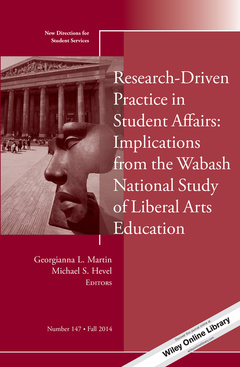Description
Research-Driven Practice in Student Affairs: Implications from the Wabash National Study of Liberal Arts Education
New Directions for Student Services, Number 147
J–B SS Single Issue Student Services Series
Coordinators: Martin Georgianna L., Hevel Michael S.
Language: English
112 p. · 15.9x22.8 cm · Paperback
Description
/li>Contents
/li>
This issue aims to bridge this gap by drawing implications for student affairs programs and practices from the results of the Wabash National Study of Liberal Arts Education, an investigation that followed thousands of college students at more than 50 colleges and universities. The authors identify research–based ways that student affairs practitioners can facilitate educational outcomes, including critical thinking, moral reasoning, and intercultural competence, while being sensitive to the needs of specific populations of students.
This is the 147 th volume of this Jossey–Bass higher education quarterly series. An indispensable resource for vice presidents of student affairs, deans of students, student counselors, and other student services professionals, New Directions for Student Services offers guidelines and programs for aiding students in their total development: emotional, social, physical, and intellectual.
EDITORS′ NOTES 1
Georgianna L. Martin, Michael S. Hevel
1. Conceptualizing Research–Driven Practice and the Wabash National Study 3
Georgianna L. Martin, Michael S. Hevel, James P. Barber
This chapter explores the concept of research–driven practice in student affairs and provides an overview of the Wabash National Study of Liberal Arts Education (WNS).
2. Developing Moral Character 13
Tricia A. Seifert
This chapter synthesizes WNS research that examined moral character and concludes with recommendations for student affairs practice.
3. Research–Driven Practice in Fraternity and Sorority Life 23
Michael S. Hevel, Daniel A. Bureau
This chapter examines the findings, implications for practice, and directions for future research provided by the WNS research that focused on fraternities and sororities.
4. Making Diversity Work to Improve College Student Learning 37
Kathleen M. Goodman, Nicholas A. Bowman
This chapter summarizes how diversity experiences influence college students′ educational outcomes and offers recommendations for practice to maximize these benefits on all campuses.
5. The Effects of Student Interactions With Student Affairs Professionals on College Outcomes 49
Georgianna L. Martin, Melandie McGee
This chapter explores how students′ interactions with student affairs professionals influence college outcomes with a particular focus on applying findings to student affairs practice.
6. Exploring Students′ Integration of Learning After Four Years of College 59
James P. Barber
This chapter uses findings on integration of learning from the qualitative portion of the WNS to discuss how students make connections between skills, ideas, and knowledge across contexts.
7. What the Wabash National Study Can Teach Us About At–Risk Student Populations 77
Teniell L. Trolian
This chapter surveys WNS results that explored how "at–risk" identities affect students′ educational outcomes and offers advice on how to ensure the success of these students.
8. Becoming a Scholar–Practitioner in Student Affairs 89
V. Leilani Kupo
This chapter explores the meanings of "scholar–practitioner" and explores habits of mind that encourage participation in scholarly activities and incorporating evidence in professional practice.
INDEX 99




